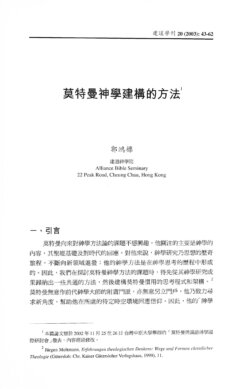莫特曼神學建構的方法/郭鴻標
撮要
莫特曼神學思想在神學與處境辯證及對話的過程中形成,其反省神學的四個重要處境是個人經驗、堂會、國家層面的教會,及大學。莫特曼無意建立封閉神學系統,卻傾向開放對話的整合。他的神學要點是三一神觀下的十架神學。三一上帝與人類世界的互動確立三一上帝歷史的內容,這是他所謂以辯證方法做神學的意思。在縱向辯證過程以外,還有橫向朝跨科際及跨宗教對話發展。
莫特曼的神學展示適應不同處境的彈性。他由人民神學、全德國教會神學、到公共神學發展的歷程,根源於由堂會、神學院,到大學處境的轉變。我們欣賞其神學系統開放,卻認為他缺少整合的概念及架構。同時,他提出將安瑟倫及亞奎那神學方法結合,對神學詮釋方面的討論有所貢獻;可惜他只有提及其個人路線而沒有進一步交代。
ABSTRACT
The development of Moltmann’s theological thought is in a dialectical and dialogical process between theology and context. The four important contexts for theological reflection are personal life experience, congregation, church in national level and university. Moltmann has no intention to build up a closed theological system, but prefers an open dialogical integration. His theological locus is the theology of the cross in Trinitarian perspective. The interaction of the Trinitarian God with human world defines the content of the Trinitarian history of God. It is in his term a dialectical way of doing theology. Besides this vertical dialogical process, there is a horizontal dialogical dimension that aims at inter-disciplinary and inter-religious dialogue.
Moltmann’s theology shows a flexibility of adapting different contexts. He develops from folk’s theology to (whole German) church theology and then to public theology in the changing of contexts from congregation to seminary and then to university. We appreciate his open theological system but what is lacking is an integrated concept and structure. Moreover, the combination of the theological method of Anselm and Aquinas is a contribution for theological hermeneutical discussion, however, Moltmann has just mentioned his personal way without further elaboration.
原載於《建道學刊》20期(2003年7月),頁43-62。
作者簡介
郭鴻標
副院長 (行政)








